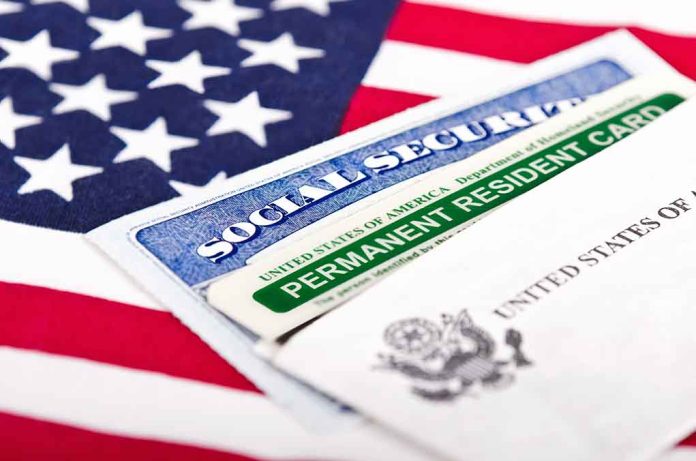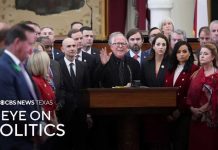
President Trump’s bold $1,000 premium visa fee proposal aims to streamline entry for affluent tourists while offering a $5 million pathway to citizenship for the wealthy elite.
Key Takeaways
- The Trump administration is implementing a $1,000 expedited processing fee for non-immigrant visa interviews, in addition to the standard $185 application charge
- A proposed “gold card” program would offer U.S. citizenship to wealthy individuals willing to invest $5 million
- State Department legal advisors have raised concerns about the legality of fees that exceed the actual cost of service
- The program could be piloted as early as December, despite potential legal challenges
- International travel spending in the US is projected to decline by approximately 7% in 2025 due to stricter immigration policies
Premium Processing for Visa Applicants
President Trump’s administration is moving forward with a strategic immigration policy that prioritizes efficiency and financial investment in America. The proposed $1,000 fee for expedited visa interview appointments represents a market-based solution to the backlog plaguing our visa processing system. This premium service would provide applicants who value their time—and America’s opportunities—the chance to move forward quickly, while generating additional revenue that can be invested in strengthening our immigration infrastructure.
The expedited processing option stands in addition to the current $185 application fee that all non-immigrant visa applicants must pay. This two-tiered approach maintains access for all legitimate applicants while creating an express lane for those willing to invest more in their visit to the United States. The program could begin as early as December, demonstrating the administration’s commitment to implementing practical solutions that benefit our economy while maintaining control over who enters our country.
Wealth-Based Immigration Reform
The premium visa processing fee is part of a broader vision for immigration reform that includes a groundbreaking “gold card” program. Under this proposal, wealthy individuals who invest $5 million would have a path to American citizenship. This approach recognizes that immigrants who bring substantial financial resources can make immediate positive contributions to our economy without becoming dependent on government assistance or taking jobs from American citizens.
“The department’s scheduling of non-immigrant visa interview appointments is dynamic and we are continually working to improve our operations worldwide,” said a State Department spokesperson.
The Trump administration’s initiative represents a fundamental shift from the previous approach that failed to distinguish between immigrants who contribute to America and those who burden our social systems. By prioritizing individuals who demonstrate financial stability and a desire to invest in our nation, we can create an immigration system that truly works for the benefit of American citizens while welcoming those who share our values of hard work and self-sufficiency.
Legal Considerations and Implementation Challenges
Despite the clear benefits of the proposal, the State Department’s legal team has raised concerns about potential challenges to the fee structure. According to internal memos, the fees may face scrutiny if they significantly exceed the actual cost of providing the expedited service, as this could conflict with Supreme Court precedent. However, these concerns should be viewed in the context of the current immigration crisis and the urgent need for solutions that restore order to our borders.
“The Trump administration is considering a $1,000 fee for tourists and other non-immigrant visa applicants seeking an expedited interview appointment though government lawyers have raised legal red flags over the plan, according to a US official and an internal State Department memo.”
In fiscal year 2023, the State Department issued 10.4 million non-immigrant visas, including 5.9 million tourist visas. This large volume demonstrates the significant interest in visiting America and the potential revenue that could be generated through premium processing fees. While critics suggest that increased scrutiny on immigration may lead to a projected 7% decline in international travel spending in 2025, this temporary adjustment is a small price to pay for restoring integrity to our immigration system and ensuring that visitors respect our laws and sovereignty.
A Strategic Approach to Immigration
President Trump’s visa initiatives reflect a strategic approach to immigration that prioritizes America’s interests. By implementing fees for expedited processing and creating pathways for wealthy investors, the administration is crafting an immigration system that works for American citizens first. These policies recognize that while America remains welcoming to legal immigrants who follow the rules and contribute to our society, we have the right and responsibility to control who enters our country and under what conditions.
The administration’s broader immigration reform efforts, including increased scrutiny of student visas and revocation of visas for those who violate their terms, represent a coherent policy that supports America’s security and economic interests. Unlike the previous open-border policies that created chaos and unfair competition for American workers, President Trump’s approach offers clear rules, paths for legal entry, and priorities that benefit our nation. This comprehensive strategy will help ensure that America remains a sovereign nation that controls its own destiny.







